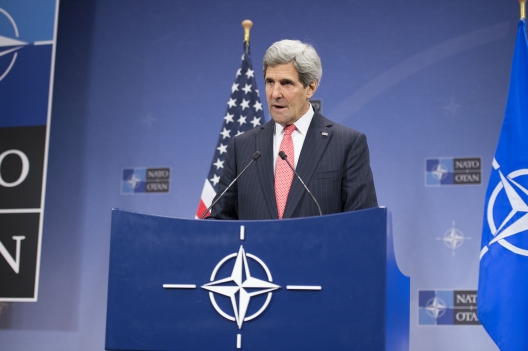 2014 is really going to be a pivotal time for NATO and for a transformation that is taking place with respect to NATO engagement and responsibilities. It will be a pivotal time for our alliance and for the transatlantic relationship.
2014 is really going to be a pivotal time for NATO and for a transformation that is taking place with respect to NATO engagement and responsibilities. It will be a pivotal time for our alliance and for the transatlantic relationship.
We will mark a number of very important anniversaries in the U.S.-European relationship next year: 100 years since Sarajevo and the outbreak of World War I; 70 years since Normandy; 25 years since the Berlin Wall fell; and 15, 10, and 5 years since NATO’s post-Cold War enlargements. As our nation honors those anniversaries and comes together for both the EU and the NATO summits, we have to take every single opportunity in order to renew our commitment to the transatlantic relationship and to cement NATO’s role as the transatlantic core of a global security community.
The Secretary General has outlined three key areas for the South Wales summit: first, the way forward in Afghanistan; second, the capabilities that NATO will need to continue as the most successful political and security alliance that the world has ever seen; and third, NATO’s critical partnerships with countries from outside of the alliance.
Today, we discussed and we will discuss at much greater length tomorrow the tremendous progress that has been made in transitioning to full Afghan leadership in providing for that country’s security. We will also address the importance of maintaining a strong commitment to Afghanistan even after we end the NATO combat mission next year. The United States is committed to do its part in contributing to the new mission to train, advise, and assist Afghan security forces after 2014.
As that combat mission comes to a close, we must keep or make certain that we keep NATO finely tuned to be able to invest in the capabilities, the exercises, and the training that will enable all of our nations to be able to address the challenges of the future.
One lesson that we can certainly draw from NATO’s history, and that is the value of helping to support local security forces, particularly as a means of stabilizing post-conflict situations. We now need to institutionalize this ability to be able to train, and we need to do what we can to help countries that need and want our support in that training exercise.
Today, we also spoke about how we can energize existing partnership frameworks like the ones that exist in the countries of the Mediterranean and the Gulf, and how we can deepen cooperation with our key operational partners, those most capable are willing to deploy with us when and if needed. Both of these objectives will be critical parts of protecting our ability to deploy whenever and wherever needed.
We also recognized that the security threats of the future are not going to look like the security threats that we face today in many respects. I joined Minister Paet in signing a U.S.-Estonian Cyber Partnership Statement earlier today, and that commits both of us to do even more together in order to combat this real and growing security concern within the cyber sphere.
When NATO was established more than 60 years ago, President Truman remarked, “If there is anything inevitable, if there is anything unconquerable in the world today, it is the will of the people of all nations for freedom and peace.” Since then, NATO has played an absolutely essential role in supporting that will around the globe. As we build on today’s discussions and focus on our partnerships, our capabilities, and our enduring commitment to Afghanistan, I personally have every confidence that NATO will continue to protect freedom, continue to try to push for and bring about peace, and it will do so for decades to come.
Excerpt from remarks by Secretary of State John Kerry at NATO, December 3, 2013.
Image: Secretary of State John Kerry at NATO HQ, December 3, 2013 (photo: NATO)
